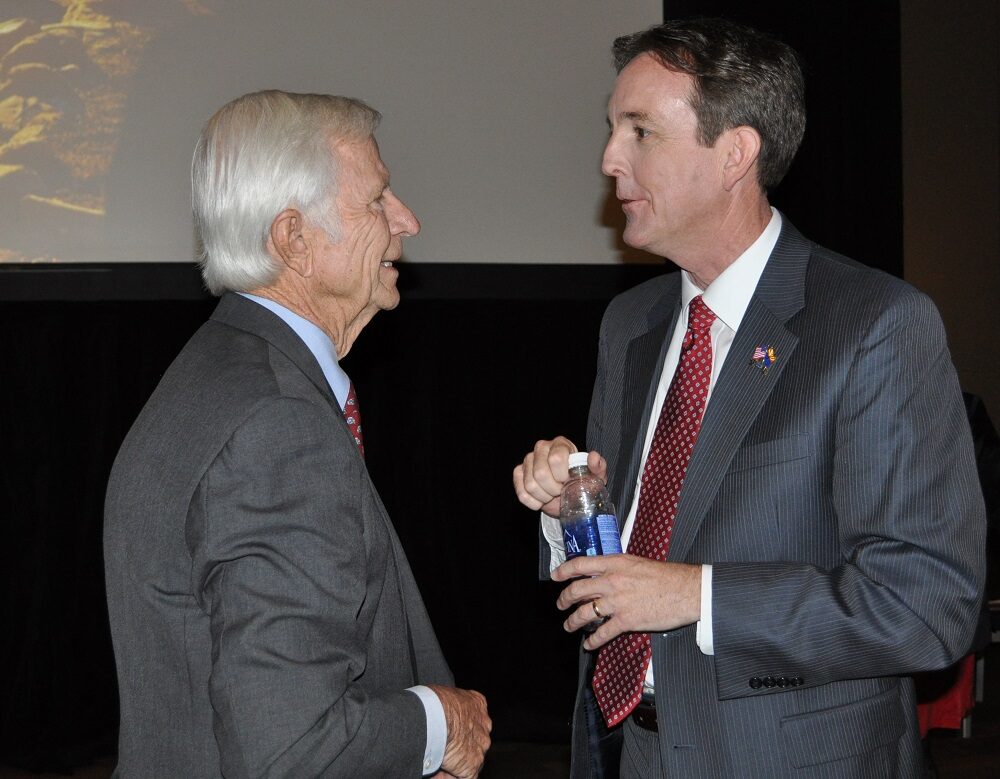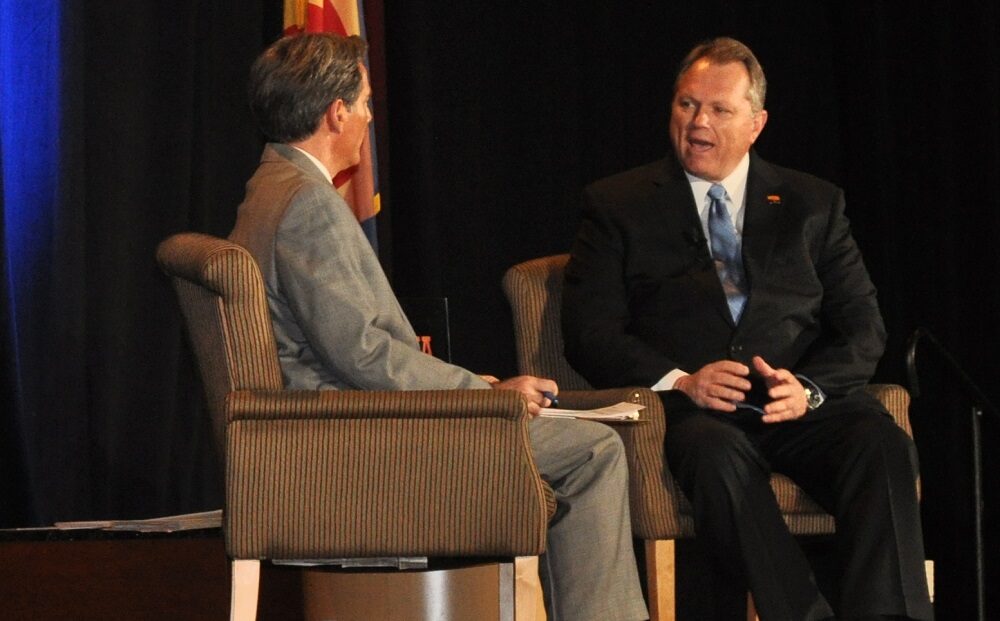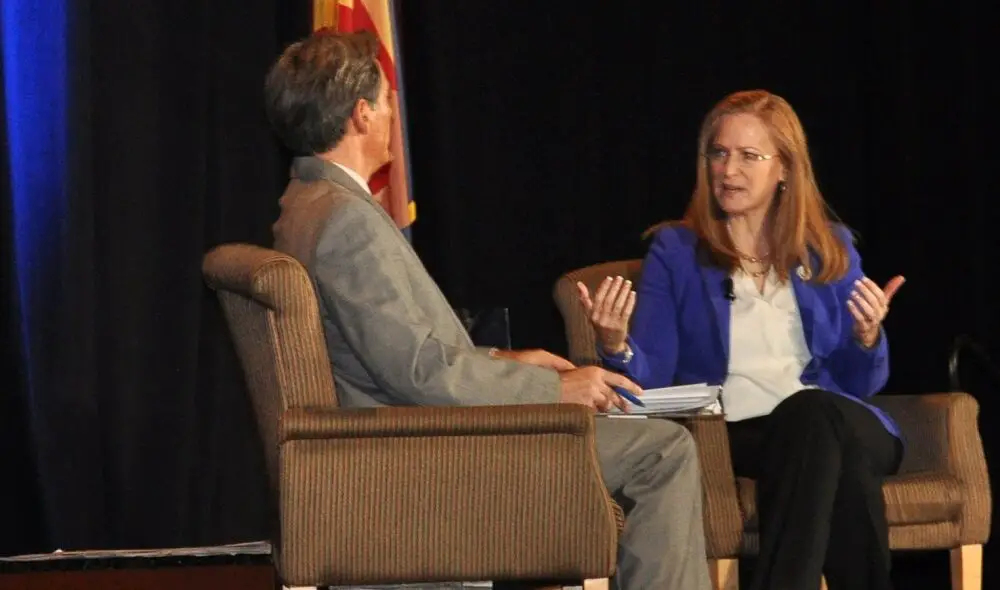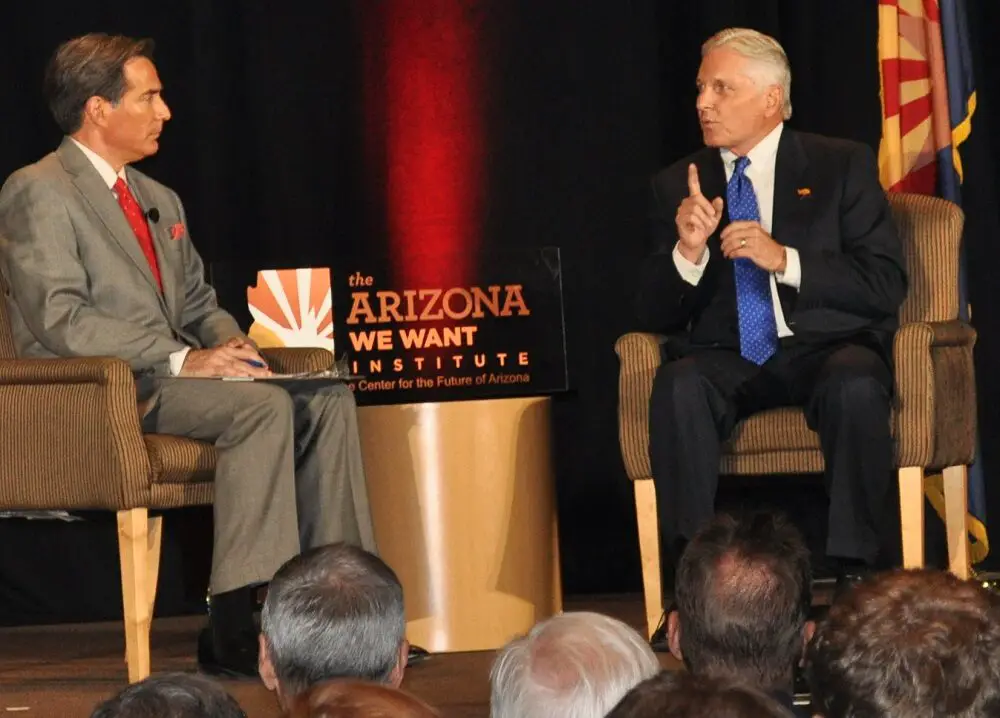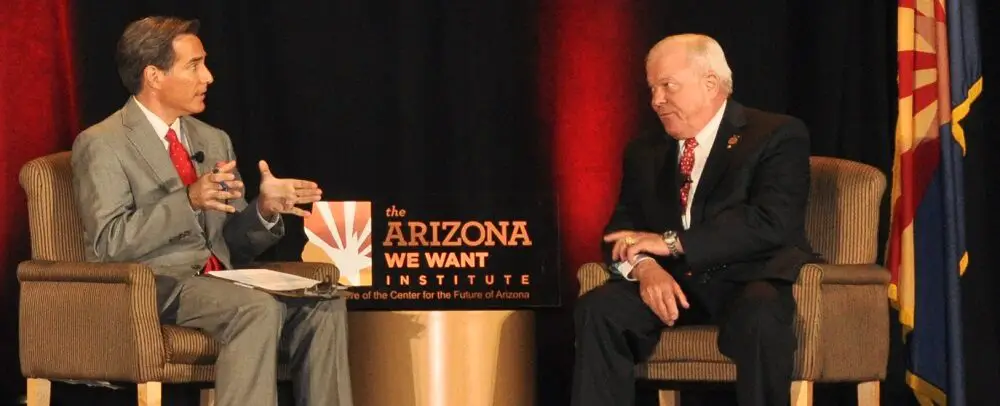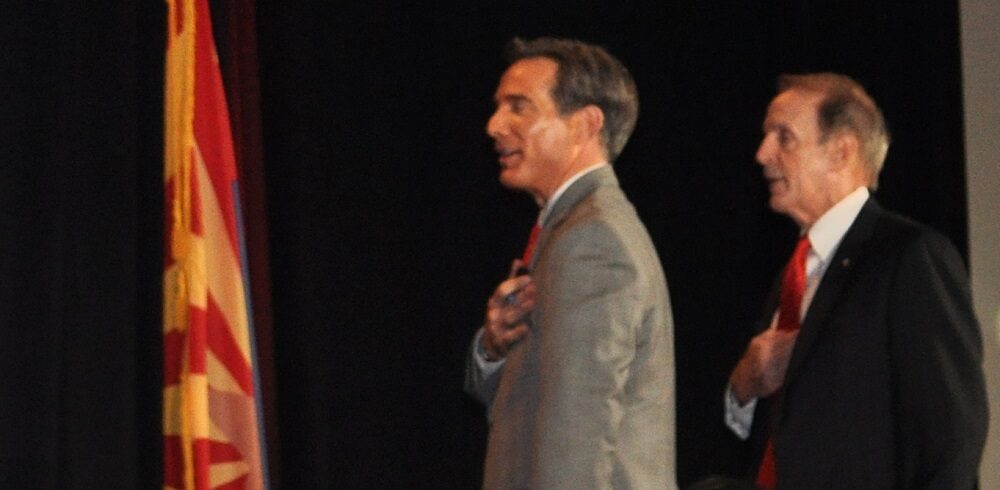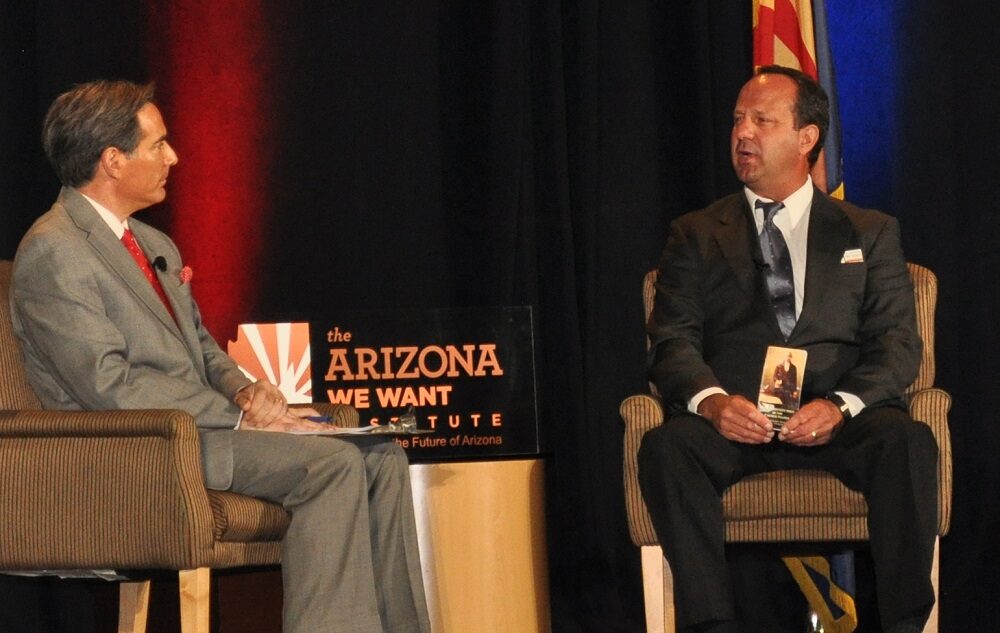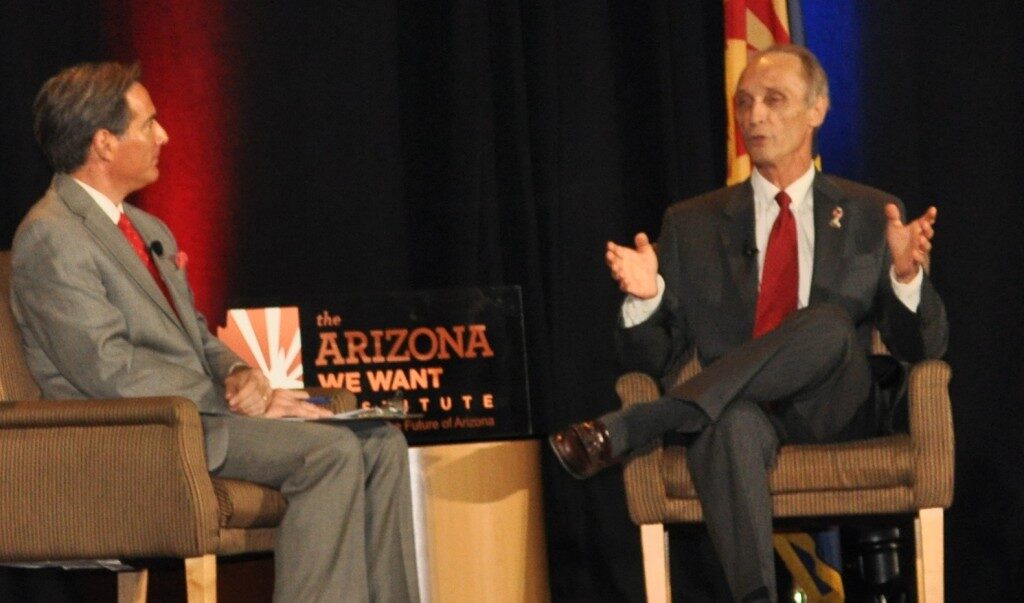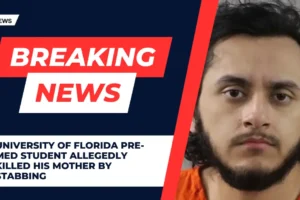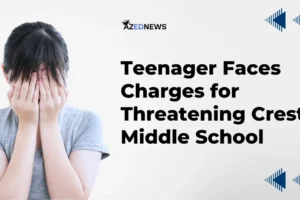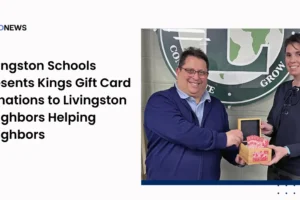Nine candidates for Arizona governor said they wanted to improve the state of K-12 education at a forum hosted by The Arizona We Want Institute and sponsored by azcentral.com, but they outlined different ways of doing that.
The candidates participating in the June 6 event were Republicans Ken Bennett, Doug Ducey, Christine Jones, Al Melvin, Frank Riggs, Scott Smith, Democrat Fred DuVal, Libertarian Barry Hess and Independent John Lewis Mealer.
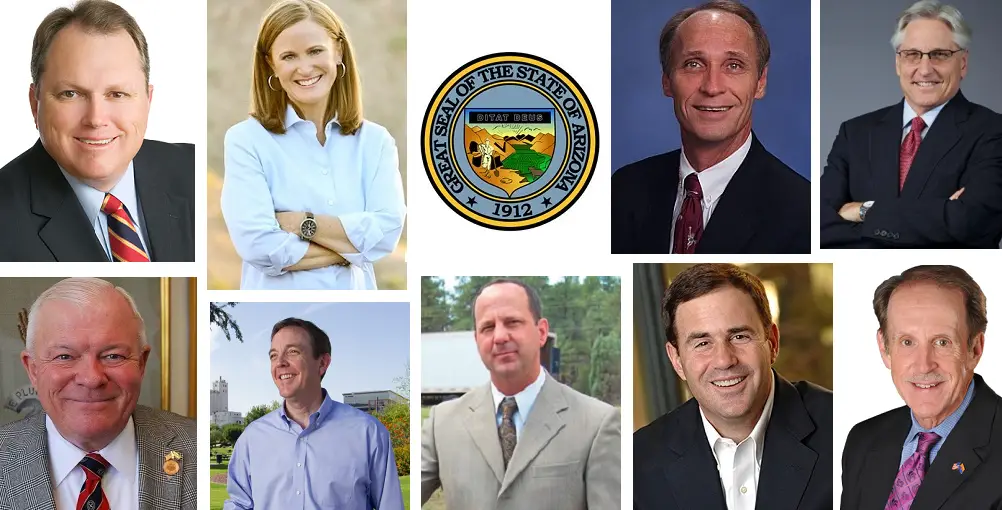
Bennett, Arizona’s current secretary of state, led off the forum moderated by 12 News anchor Brahm Resnik by saying he would increase K-12 education funding by growing the economy.
“I want to fix our education system,” Bennett said. “We have some great schools in Arizona and some great educators, but we have some underperforming ones, because of the average percentages that you mentioned. If we can focus on helping those that are falling behind to get up near the median, I want to be the first in the country in education in four years, and first in the world in eight.”
Bennett, like most gubernatorial candidates, said he opposes Common Core education standards. Arizona is one of 42 states and Washington, D.C., that adopted new standards based on the Common Core. Arizona did so in 2010. Here they are called Arizona’s College and Career Ready Standards.
Melvin, currently an Arizona State Senator in District 26, championed the failed Senate Bill 1310, which was introduced in the last legislative session and would have barred Arizona from implementing Common Core standards.
Ken Bennett, right, talks with Lattie Coor, chairman and CEO of the Center for the Future of Arizona, after the forum.
“With this Common Core crap they’re actually saying my school is just like yours,” said Hess, Libertarian party chair and author.
Ducey, Jones, Hess, Mealer and Riggs also said they oppose Common Core standards.
Only two candidates – former Mesa Mayor Scott Smith and Fred DuVal – said they support the standards, which proponents say will better prepare students for their future with in-depth knowledge, critical thinking and communications skills, as well as the ability to solve problems as part of a team.
“I support Arizona’s efforts over the last few years to raise standards and raise the bar on Arizona’s College and Career Ready Standards,” said Smith. “I think that high expectations are important. I come from an education background, my family is immersed in education.”
Smith said strong standards and high expectations are “necessary if we’re going to give every child in Arizona an excellent education.”
Scott Smith, right, answers 12 News anchor Brahm Resnik’s questions about why he supports Arizona’s College and Career Ready Standards during the 2014 Gubernatorial Candidate Forum.
“There’s flexibility that’s given to our excellent teachers, there’s local control in defining curriculum, and those teachers can adapt the curriculum and adapt teaching styles to each child so every child can be taught in a way that best accommodates their specific needs,” Smith said.
As governor, Smith said he would watch how the standards are implemented in the classroom, provide necessary funding and measure their effect.
“None of these things can be accomplished unless you give our teachers the resources they need to accomplish this,” Smith said. “We talk a good talk about education, but until we’re truly willing to give our teachers the flexibility, respect them and give them the resources they need in the classroom, what are we?”
When Resnik asked what candidates would do about education funding, Jones said she would like to raise K-12 funding per pupil to the national average.
Christine Jones, right, tells Brahm Resnik she would like to raise K-12 funding to the national average during the forum in Phoenix on June 6.
“If we could move from the 54 cents that we spend per student and just get to the national average which is about 62 cents that would make a huge difference,” said Jones, former GoDaddy chief legal counsel.
That extra $800 million into the classroom would provide “more income for teachers, smaller student-teacher ratios, more money for curriculum, supplies and the basic fundamental things that help teachers impart knowledge,” Jones said.
Jones said she’d look for savings in the state’s school districts in technology solutions, efficiency and economies of scale in school contracts.
“Who cleans the building? Who takes the trash away? What teachers are educating the kids? There are some places you can pick up the low hanging fruit,” Jones said. “Those 227 districts, if we can’t consolidate them, let’s pull out the places where we’re spending unnecessarily.”
Fred DuVal tells Brahm Resnik he won’t take another penny out of education during the 2014 Gubernatorial Debate in Phoenix on June 6.
When Arizona’s economy improves, the state should “go back to re-investing in our children, in our work, and our state’s future in the way so many other states are,” said DuVal, who worked in the administrations of Arizona Gov. Bruce Babbitt and former President Bill Clinton.
“The driver of the 21st century is about talent,” DuVal said. “If we do not appreciate getting back into early childhood education as 30 states did this year, we should – particularly with a third-grade reading requirement.”
DuVal said he would look at pooling procurement statewide into one centralized model to save money and that he might have to consider tapping “in a modest way” the state rainy day fund.
“Let me make it clear what I won’t do. I won’t take another penny out of education. We have decimated public education in Arizona,” DuVal said.
Al Melvin tells moderator Brahm Resnik he supports a universal school voucher during the 2014 Gubernatorial Candidate Forum in Phoenix.
DuVal cited Arizona universities’ budgets cut by half a million dollars in one year during the recession as an example.
Two candidates said they support universal K-12 school vouchers.
“I believe, as Milton Friedman did, in maximum parental school choice with a universal school voucher of about $8,000 per child,” Melvin said. “We’re spending about $9,000 with $1,000 coming from the feds, $4,000 from the state and $4,000 local total.”
Riggs, a former U.S. Congressman, said he would like to work with the conservative Republican majority in the State Legislature to create a system where “the dollars follow the child to the schooling or education option” the parent chooses as “the best and most appropriate education for their child.”
“We have more charter school per capita, K-12 population, than any other state,” said Riggs, founder, former president and CEO of Charter Schools Development Corp., a non-profit that helps charters finance construction. “And it’s one of the very robust forms of school choice. I like to call it parental school choice that we have here in Arizona that includes tuition tax credits, education Empowerment Savings Accounts.”
Frank Riggs, right, led the audience in The Pledge of Allegiance to honor veterans on the anniversary of D-Day during the 2014 Gubernatorial Candidate Forum in Phoenix on June 6.
When asked what would happen to the public school system, Riggs said “Good public schools will survive and thrive” as they become schools of choice through market forces.
“If you’re asking what do we do to the infrastructure, schools can be converted to other uses, those facilities, that’s clear,” Riggs said.
Ducey, currently Arizona state treasurer, said he would like to see Arizona lead the nation in economic development, job creation, business relocation and outcomes in K-12 education.
While Ducey said “I don’t look at this as a charter versus K-12 education debate,” he did say that the state needs to look at its school funding formulas.
Doug Ducey, right, tells Brahm Resnik he would look at the flexibility of school funding formulas during the forum June 6 in Phoenix.
“Our funding formulas were written in the early ‘80s,” said Ducey, former co-owner of Cold Stone Creamery. “I would like to see us have some flexibility and see us fund the wait list.”
“I’m someone who believes in the market and I believe that parents make better decisions for their kids than bureaucrats,” Ducey said. “When there’s a 9,000-kid wait list at Great Hearts Academy or a 2,000-kid wait list at BASIS, Mom and Dad have said I want my child to go to that school, but that school can’t expand quickly enough. I think you can look at the flexibility in these funding formulas so that we could fund and resource what works and stop funding the stuff that isn’t working.”
Jones said Arizona has an opportunity to use “some great education models” to help failing schools.
“We have three of the top 10 high schools in the country right here in Arizona, and yet we’re ranked” low in student achievement, Jones said. “We must take a look, honestly evaluate and say who’s running those institutions matters, who’s teaching those kids matters.”
John Lewis Mealer said he supports raising teachers’ pay to moderator Brahm Resnik during the forum in Phoenix.
Mealer, who spent years in the construction industry developing kit homes from alternative materials, suggested increasing teacher pay.
“The state should step in and double or triple the pay of teachers so we can get them really involved with their students – $100,000 a year is not too much,” Mealer said.
Mealer said he’d also “like to see industry deal with training students for the future, because college is not for everybody.”
Hess said he supports distance learning, restructuring the curriculum and instituting “a real advocacy for home schooling.”
“We’re trying too much to educate them for every single possible income or employment they could have and that’s too much,” Hess said. “I believe we should reduce the curriculum down to the very basics with the most fundamental being critical thinking skills.”
Barry Hess, right, tells Brahm Resnik that he supports distance learning and restructuring the curriculum during the forum on June 6.
Hess said the number of school districts in Arizona is “ridiculous.”
“I would like to get rid of that bureaucracy to a large part and put control of schools back into the local community so that we get a competitive atmosphere,” Hess said.
Bennett, Ducey, Hess, Mealer and Melvin said they’d like to get rid of the state income tax.
Melvin said he would eliminate income taxes for individuals as quickly as possible, phase out the corporate income tax over eight years, and increased economic activity and tort reform would make up the difference.
Bennett said he would replace revenue with a sales tax, while Ducey said he would “begin by lowering the income tax with the goal of eventually driving it down to zero.”
Mealer said he would “lower every tax by at least two points, (and) eliminate the state income tax.”
Resnik said eliminating the state income tax would reduce the state budget by $3.4 billion dollars, or 40 percent.
Jones criticized candidates who say they can eliminate the income tax, saying “at the moment, we don’t have a replacement for it. We barely meet our revenue obligations as it is.”
“As a tax payer I love this notion of getting rid of the income tax, but if we really are to eliminate the income tax where does that $3.5 billion dollars come from?” Jones said. “And if we are to eliminate the corporate income tax where does that extra billion come from give or take? I just think we ought to be candid and, in taxation, transparent and have some accountability and tell taxpayers what additional tax are you going to put in place if you’re going to eliminate the income tax.”
Smith said a campaign promise about eliminating the state income tax would have a difficult time being implemented.
“Are we actually going to have this debate about an income tax repeal, which would be $3.5 to $4 billion dollars depending on what’s included?” DuVal said. “If you’re going to do that you’re going to have to say, how many hundreds of schools do you close? How many prisons do you empty out?”








